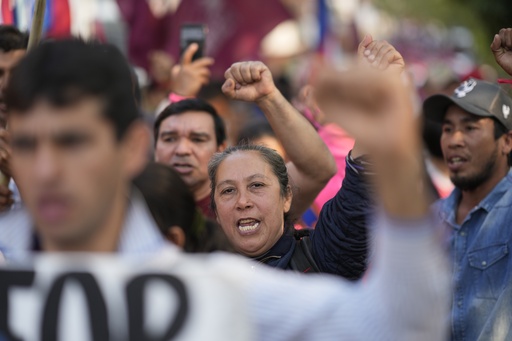
In an act of defiance against a long period of dictatorship in Paraguay, protesters in Asunción demolished a statue of General Alfredo Stroessner, the dictator who ruled the country for 35 years. Stroessner’s regime was marked by violence, with hundreds killed and thousands imprisoned without charge. Emilio Barreto, whose father was among those mistreated during Stroessner’s rule, highlighted the lasting impact of the dictatorship on Paraguay.
Although there was hope for democratic progress after Stroessner’s ouster in 1989, recent developments in Paraguay have raised concerns about a regression in civil liberties. Activists have observed a troubling trend, leading to an eruption of public outrage with protesters declaring, “Never again, dictatorship.” Hugo Valiente from Amnesty International in Paraguay criticized government actions that seem to restrict freedom of association.
Amid fears of democratic decline, a protest in Asunción coincided with the 70th anniversary of Stroessner’s rise to power, as well as President Santiago Peña’s first year in office. The rally, led by opposition figures like Senator Kattya González, aimed to challenge what they see as an undemocratic political landscape where popular will is not adequately represented.
There are concerns about the influence of former President Horacio Cartes, who is accused of corruption and continues to hold power within the Colorado party. Paraguay’s political climate has been further strained by recent actions, including the hasty passage of a bill expanding government oversight of nonprofit organizations, which critics fear could stifle civil society.
Experts argue that Paraguay has yet to fully reckon with the legacy of Stroessner, whose tenure deepened inequalities and fostered a culture of impunity. The lack of accountability for past human rights abuses contrasts with efforts in other countries like Argentina, where significant progress has been made in prosecuting dictatorship-era crimes. Paraguay still struggles to address its dark history of disappearances and state-sponsored violence.
As Paraguay grapples with its past, individuals like Rogelio Goiburú, whose father was a victim of the dictatorship, are dedicated to preserving memory and seeking justice for the atrocities committed. The fight for truth and accountability continues in Paraguay, with many refusing to forget the past in the pursuit of a more just and democratic future.
